 Petzlover
Petzlover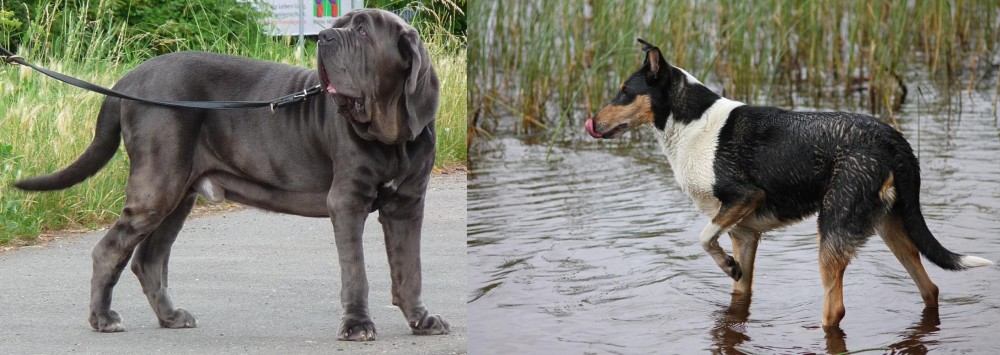 Neapolitan Mastiff is originated from Italy but Smooth Collie is originated from United Kingdom. Neapolitan Mastiff may grow 14 cm / 6 inches higher than Smooth Collie. Neapolitan Mastiff may weigh 49 kg / 109 pounds more than Smooth Collie. Neapolitan Mastiff may live 6 years less than Smooth Collie. Both Neapolitan Mastiff and Smooth Collie has same litter size. Both Neapolitan Mastiff and Smooth Collie requires Moderate Maintenance.
Neapolitan Mastiff is originated from Italy but Smooth Collie is originated from United Kingdom. Neapolitan Mastiff may grow 14 cm / 6 inches higher than Smooth Collie. Neapolitan Mastiff may weigh 49 kg / 109 pounds more than Smooth Collie. Neapolitan Mastiff may live 6 years less than Smooth Collie. Both Neapolitan Mastiff and Smooth Collie has same litter size. Both Neapolitan Mastiff and Smooth Collie requires Moderate Maintenance.
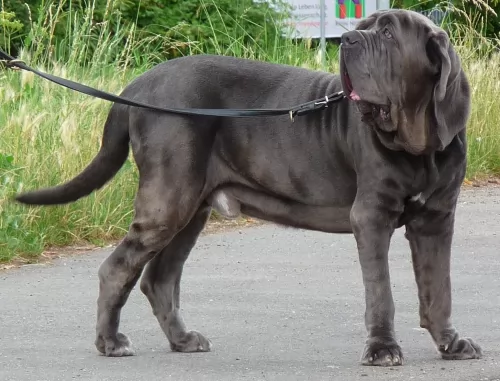 An ancient breed, the Neapolitan Mastiffs are massive dogs with a history of protecting their family and their property. The breed has deep rooted protective instincts and they are very frightening in appearance. The Neapolitan is of the Molosser group of dogs, all of whom probably came from the same line. It is known that all the mastiffs in Europe are descendants of the Tibetan Mastiff. The Tibetan Mastiff is considered the most ancient of all canines.
An ancient breed, the Neapolitan Mastiffs are massive dogs with a history of protecting their family and their property. The breed has deep rooted protective instincts and they are very frightening in appearance. The Neapolitan is of the Molosser group of dogs, all of whom probably came from the same line. It is known that all the mastiffs in Europe are descendants of the Tibetan Mastiff. The Tibetan Mastiff is considered the most ancient of all canines.
The Asian Mastiffs came from India to Greece around 300 BC with Alexander the Great. Then the breed was brought to the Romans by the Greeks and then introduced them in their circus in fights. Another possibility is that around 500 BC the mastiffs came to Britain from the Phoenicians. Either way the Roman Molossus is the ancestor of the Neapolitan Mastiff.
The Romans crossed the breed with the English Mastiff around 55 BC and developed a premiere war dog that was called a Mastini.
The breed eventually became extinct in Europe with the exception of Campania. The breed was recognized in 1946 with the standard accepted in 1949. However, it is believed that the Neapolitan Mastiff has been continuously present in Campania for over two thousand years. The breed was initially developed as war dogs and for the Roman coliseum spectacles.
In 1946 Dr. Piero Scanziani established a program to breed them in Italy. He wrote the breed standard in 1949.
Today the Neo is a farm dog, an army dog, a police dog and a guard dog. They were shown in Italy for the first time in 1946 but only in 2004 was the breed recognized by the American Kennel Club (AKC). It was 1973 when the Neapolitan Mastiff Club of America was born and 1996 when the standard was approved by the AKC. They are still a rare breed in the United States.
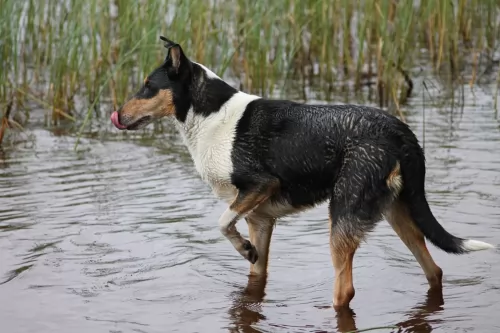 When you see the Smooth Collie you just assume that you’re looking at a long-haired Lassie-type Collie that was sent to the groomers.
When you see the Smooth Collie you just assume that you’re looking at a long-haired Lassie-type Collie that was sent to the groomers.
The Smooth Collie has always been used for herding purposes and is a short haired version of the Rough Collie. The early history of this dog is unknown and there are quite a few stories surrounding its history.
It seems as though the dog’s history started during the reign of Queen Victoria who is believed to have owned these dogs.
In some countries it is thought that the smooth- and rough collie are one and the same while in other countries they are classified as separate breeds. The dog hails from the United Kingdom and they classify the Smooth Collie as a separate breed from the Rough Collie.
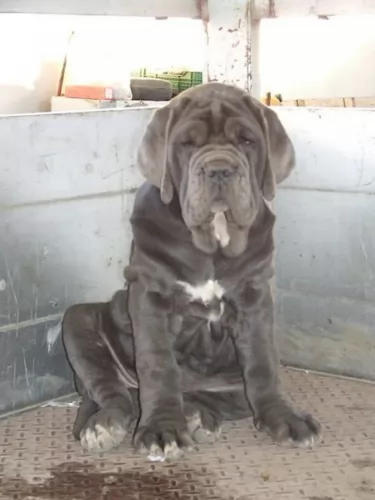 The Neapolitan Mastiff is a massive dog , so powerful and very intimidating in his looks. With an incredibly large head and hanging folds and wrinkles, the Neo is an impressive animal. His inner nobility and dignity is evident in his stance and the way he holds himself. He is relaxed, calm, quiet yet imposing none the less. His coat is dark whether black, tawny, gray or mahogany. He is muscular beyond imagination. The Neo is 10-15% longer than he is tall.
The Neapolitan Mastiff is a massive dog , so powerful and very intimidating in his looks. With an incredibly large head and hanging folds and wrinkles, the Neo is an impressive animal. His inner nobility and dignity is evident in his stance and the way he holds himself. He is relaxed, calm, quiet yet imposing none the less. His coat is dark whether black, tawny, gray or mahogany. He is muscular beyond imagination. The Neo is 10-15% longer than he is tall.
On his massive head his eyes are deep set and covered by his eye lids that droop. His eyes are blue as puppies then dark and coordinated with his coat. and his nose is large and the color of his coat. Ears are natural or can be cropped, and they carry their tail straight and curving back. The Neo has round paws and arched toes.
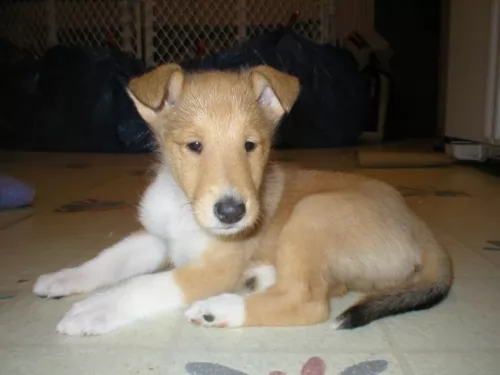 The Smooth Collie is a medium to large sized dog, ranging in size from 51–56cm and weighing anything from 18kg to 30kg.
The Smooth Collie is a medium to large sized dog, ranging in size from 51–56cm and weighing anything from 18kg to 30kg.
The Smooth Collie is slightly longer than it is tall and he has a deep chest. Most people are very familiar with the sweet, gentle expression of the Collie dogs.
The dog also has the long slender head, the semi-erect ears and a long tail. The coat of the Smooth Collie is dense and long with the outer hair being straight and harsh. The Smooth Collie comes in different colors – fawn, reddish brown, white,grey, black and tan.
The Smooth Collie is generally an amicable dog, sociable and friendly. He loves his human family and wants to be constantly with them, showing signs of separation anxiety when left for long periods on his own.
He is intelligent too so that he is easily trained. He is totally non-aggressive but that doesn’t stop him from being an excellent watchdog and he’ll alert you to strangers approaching you or your home.
They’re also energetic dogs and will require regular exercise. Although these Smooth Collies make splendid family pets, they are still used for herding purposes.
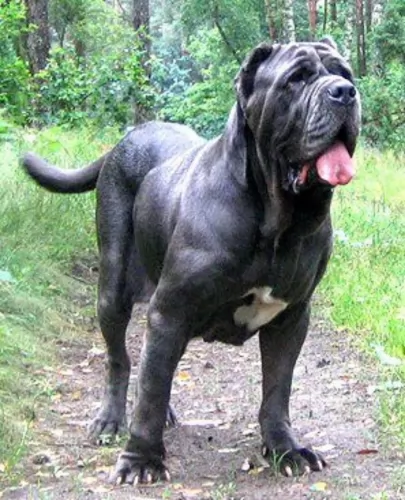 Older children in their family. No toddlers or strangers.
Older children in their family. No toddlers or strangers.
Protective yet quiet, calm, relaxed
No they won’t adapt well to apartment living or to strangers.
They are intelligent and trainable but must be socialized and know the human is the alpha or they will take over.
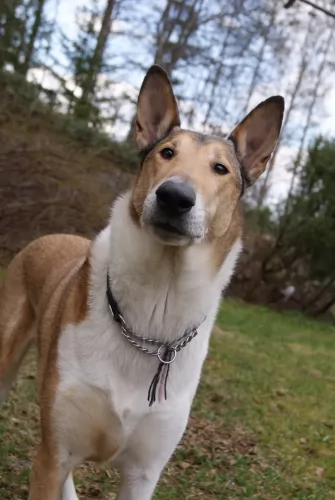 Not only is he intelligent, he is playful and energetic too, making a good pet for children and tolerating other pets too.
Not only is he intelligent, he is playful and energetic too, making a good pet for children and tolerating other pets too.
Add to that the fact that he is a a good watchdog and wants to protect his family. Sweet and gentle, the Smooth Collie is guaranteed to make a wonderful addition to your family.
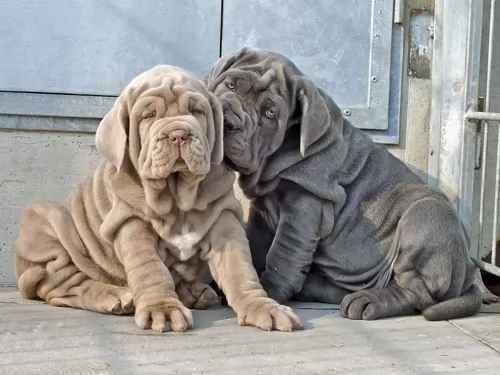 The Neapolitan Mastiff is prone to many of the same issues as any massive, extra large breed. The most common of these is Cherry Eye.
The Neapolitan Mastiff is prone to many of the same issues as any massive, extra large breed. The most common of these is Cherry Eye.
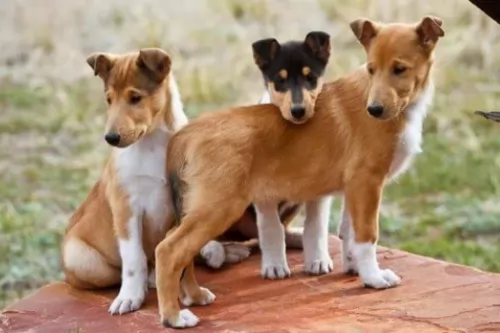 Your gentle smooth haired collie can live to be 12 to 14 years of age if he enjoys a good life, but like with other dog breeds, they can also be susceptible to certain common dog illnesses.
Your gentle smooth haired collie can live to be 12 to 14 years of age if he enjoys a good life, but like with other dog breeds, they can also be susceptible to certain common dog illnesses.
This is when the chromosomes that determine how the eyes develop are mutated, so that the blood vessels that nourish the retina and absorb scattered light are underdeveloped. When this mutation occurs it is in both eyes, but one eye could be more severely affected than the other.
Your vet will do a complete examination of your dog’s eyes to find out what the extent of the defect is.
This is a life threatening problem where the stomach twists. It is more prevalent in deep chested dogs. It can help by feeding your dog two smaller meals a day instead of one larger one which he gobbles up quickly.
Also known as Gray Collie Syndrome, this rare disease affects the neutrophils of a dog, which are an important part of the immune system. Bacterial infections and a shortened lifespan are your dog’s lot with this illness.
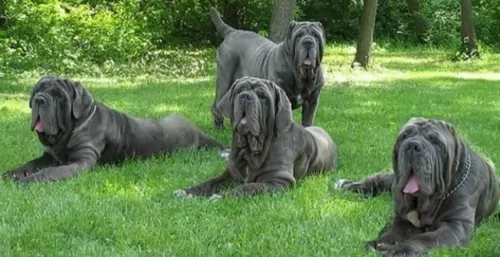 Neapolitans grow fast and so don’t overfeed when they are young. Lower protein and higher fat content.
Neapolitans grow fast and so don’t overfeed when they are young. Lower protein and higher fat content.
Don’t overfeed the adult as they can become obese.
This big hearty breed needs exercise but not too much. They overheat easily. The puppy will push himself, so you have to make sure he doesn’t over do it. No tug of war games. They need a long walk twice every day.
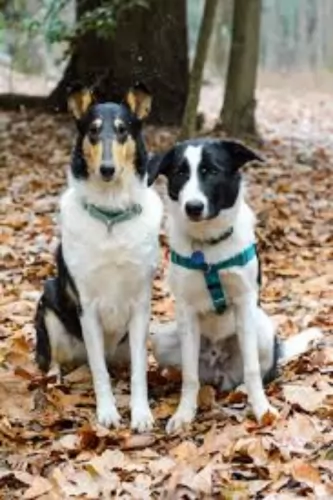 Your Smooth Collie deserves the very best food there is because of the wonderful companionship he provides you with. You want him to enjoy good health and a long life with you.
Your Smooth Collie deserves the very best food there is because of the wonderful companionship he provides you with. You want him to enjoy good health and a long life with you.
If you buy one of the commercially manufactured dog foods, make sure it is one of the best – packed with vitamins and minerals and good, natural ingredients.
Follow the instructions on the packaging for portion sizes. Also include some plain, wholesome dog food made at home. The perfect example of this is boiled chicken, brown rice or pasta and sweet potatoes, spinach and carrots all chopped up and added to your dog’s dry kibble as a treat twice a week. No need to add in exotic spices. Avoid onions.
Try and include some raw meat into the diet once in a while too. Make sure your Smooth Collie has a constant supply of fresh, cool water.
This is one of the best things you can do for your Collie, eliminating the possibility of your pet becoming a parent of unwanted puppies.
Brush your Smooth Collie twice a week. He is a moderate shedder but has a couple of heavier shedding periods.
While brushing your pet, check inside the ears for signs of infection, check that his eyes are still bright and alert and check inside his mouth for bad teeth. He can’t tell you about a rotting tooth and this can cause a host of other problems for your dog.